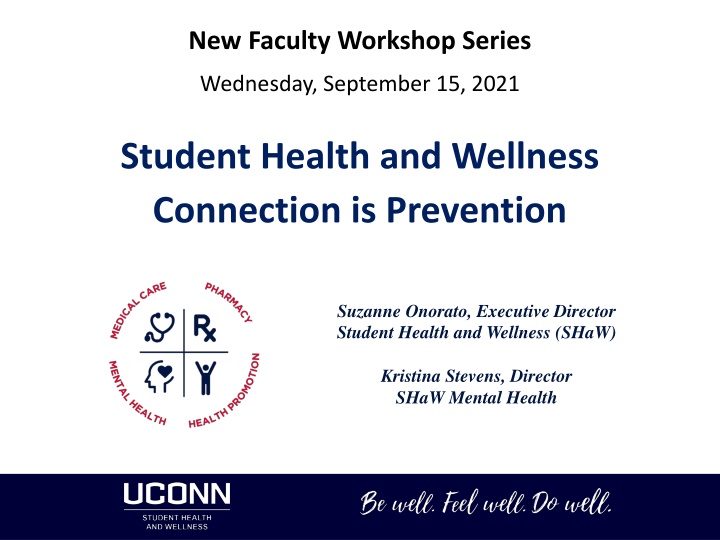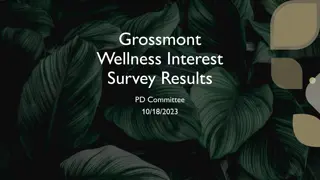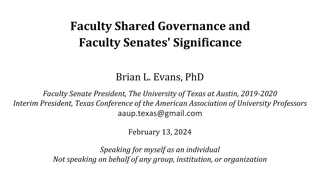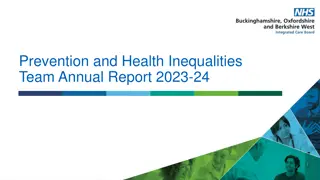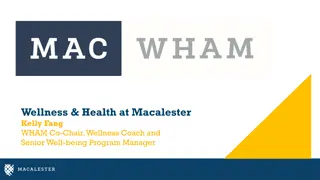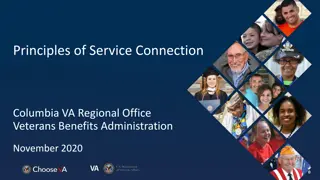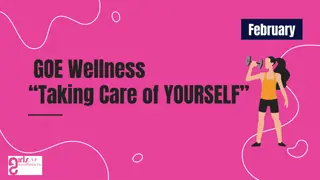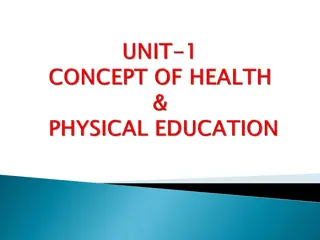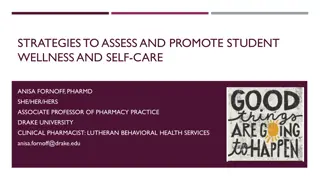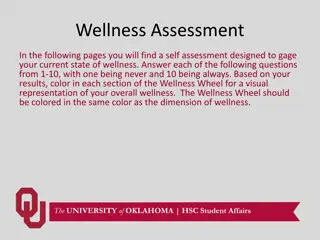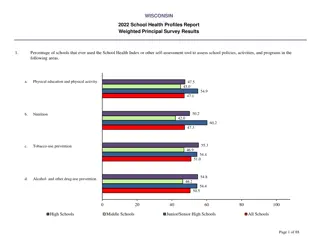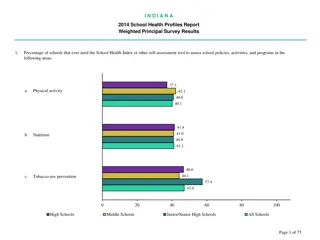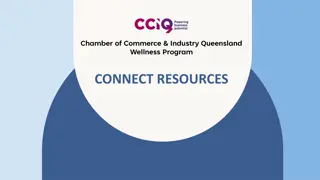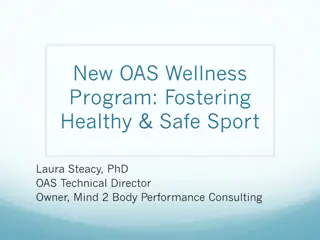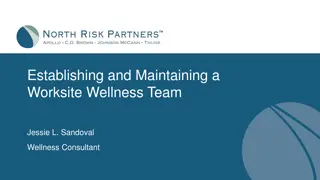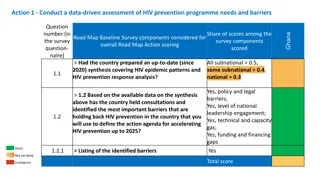New Faculty Workshop Series: Student Health and Wellness Connection is Prevention
The New Faculty Workshop Series on Wednesday, September 15, 2021, focuses on student health and wellness, emphasizing prevention at the University of Connecticut. Featuring speakers Suzanne Onorato, Executive Director of Student Health and Wellness (SHaW), and Kristina Stevens, Director of SHaW Mental Health, the agenda includes discussions on SHaW services, the importance of student mental health, a multi-tiered approach to student wellbeing, and available resources for faculty. SHaW's vision is to cultivate optimal health and lifelong well-being for every UConn student, offering services such as medical care, pharmacy, mental health support, and health promotion. The session delves into the mental health challenges faced by college students, with a strong focus on addressing these issues effectively.
Download Presentation

Please find below an Image/Link to download the presentation.
The content on the website is provided AS IS for your information and personal use only. It may not be sold, licensed, or shared on other websites without obtaining consent from the author.If you encounter any issues during the download, it is possible that the publisher has removed the file from their server.
You are allowed to download the files provided on this website for personal or commercial use, subject to the condition that they are used lawfully. All files are the property of their respective owners.
The content on the website is provided AS IS for your information and personal use only. It may not be sold, licensed, or shared on other websites without obtaining consent from the author.
E N D
Presentation Transcript
New Faculty Workshop Series Wednesday, September 15, 2021 Student Health and Wellness Connection is Prevention Suzanne Onorato, Executive Director Student Health and Wellness (SHaW) Kristina Stevens, Director SHaW Mental Health
New Faculty Workshop Series Student Health and Wellness Connection is Prevention Agenda: 1. Student Health and Wellness (SHaW) Services 2. Why Focus on Student Mental Health and Wellbeing? 3. SHaW s Multi-Tiered Approach to Student Wellbeing 4. Student Mental Health Services and Faculty Resources 5. Questions
SHaW Vision Statement To Cultivate Optimal Health and Lifelong Well-being for Every UConn Student
SHaW Service Lines: Medical Care Hilda May Williams Building 234 Glenbrook Road 860-486-4700 Pharmacy Mental Health Health Promotion Arjona Building 4th Floor 337 Mansfield Road 860-486-4500 Wilson Building South Campus 860-486-9431 Regional Campus Locations
Overview of SHaW Services Medical Care and Pharmacy: COVID Testing and Care Primary Care Women s Health Orthopedics and Sports Medicine Nutrition Services Sexual Assault Services (SAFE) Transgender Care 24 Hour Advice Nurse Line* Allergy and Travel Medicine Pharmacy Radiology Blood Draw Overnight Infirmary Mental Health: Emergency Screening & Crisis Support* Routine Assessment* Individual and Group Therapy Psychiatric Services Alcohol and Other Drugs Counseling Services Eating Disorders Services Health Promotion: Wellness Coalition Collective Impact Approach Wellness Education Framework* UConn Recovery House * Available to Regional Campus Students
Why Focus on Student Mental Health and Wellbeing? College Students (And Their Parents) Face A Campus Mental Health 'Epidemic' College Students of Color: Confronting the Complexities of Diversity, Culture, and Mental Health April 2, 2018 By Annelle B. Primm Most Pressing Issues for College and University Presidents For the fourth time in our survey series, 72% of college presidents identified the most pressing issue was the mental health of students." March 4, 2021 May 28, 2019 Heard on Fresh Air Colleges struggling to meet rising demand of students seeking mental health help November 25, 2019 Trans Students Often Struggle With Mental Health Gender-nonconforming students are four times more likely than peers to report mental health issues such as depression and suicide,. The College Student Mental Health Crisis Today's college students are suffering from an epidemic of mental illnesses. By Jeremy Bauer-Wolf August 20, 2019 Feb 15, 2014
Most Pressing Concerns National Student Mental Health Trends 2007-2016
Most Pressing Concern Increased Rates of Mental Health Service Utilization by U.S. College Students: 10-Year Population-Level Trends (2007 2017) Sarah Ketchen Lipson, Ph.D., Emily G. Lattie, Ph.D., Daniel Eisenberg, Ph.D., American Psychiatric Association, 2018. Change in College Student Mental Health 155,000 students at 196 college campuses. 40% 36% 34% 35% 79% increase in students treated for mental health issues in past year from 2007 to 2017. 30% 25% 22% 19% 20% 15% 64% increase in students with lifetime mental health diagnosis from 2007 to 2017. 10% 5% 0% Treated for Mental Health Issues in Past Year Lifetime Mental Health Diagnosis 2007 2017
UConn American College Health ACHA Survey Results - 2019 UConn ACHA Student Profile 100% 87.2% 90% 80% 73.5% 70% 60% 50% 42.1% 41.9% 40% 24.2% 30% 20% 4.3% 10% 0% * All measures are for past 30 days; Mirror National Results
Leveraging the Continuum of Care and Environmental Level Strategies Healthy At Risk Becoming Unwell Unwell Crisis Treatment Early Intervention Prevention Early Identification Early Referral Access to Resources Connected Transitions Wellness Framework Skill Building Resiliency Training Stigma Reduction Medical Services Psychological Services Clinical Support Services Crisis Management Culture of Caring Culture of Wellness Culture of Excellence Health Promotion and Environmental Levels of Community Impact
Ecological Approach Focuses on both population-level and individual-level determinants of health Environmental factors interact and affect individual behavior A comprehensive approach connects health, campus culture and learning Community involvement leads to community impact Coordinated, system-level solutions allow us to broaden reach and maximize resources Source: American College Health Association (https://www.acha.org/HealthyCampus/HealthyCampus/Ecological_Model.aspx)
UConn Campus-Wide Community Impact Initiatives Influencing a Culture of Wellness at UConn President s Mental Health Task Force Regional Campus Task Force on Access to Care and Community Health UConn Wellness Coalition Life-Transformative Education (LTE)
Campus-Wide Initiatives UConn Wellness Coalition Wellness Coalition Advisory Council Student Engagement JED Campus & Mental Health Academic Affairs Partnership AOD Collaborative Suicide Prevention Innovate Wellness URC Advisory Council
New Faculty Workshop Series Student Health and Wellness Connection is Prevention Student Mental Health Services and Faculty Resources Kristina Stevens, Director SHaW Mental Health
SHaW Mental Health Who we are: The right supports at the right time. Student Health and Wellness Mental Health works closely with University partners to offer a comprehensive range of options to meet students needs. Offering students access to a personalized approach that promotes wellbeing and meets their mental health needs by offering (1) Rapid access to (2) solution focused, student centered approach (3) using interventions with proven outcomes (4) to meet the diverse needs (5) of our students (6) throughout their college experience Wellness Resources Clinical Case Management Let's Talk Crisis Support Consultation Medication Management Individual Therapy Group Therapy
SHaW Mental Health Services Total Encounters and Total Distinct Students FY15 - FY19 25,000 2,927 2,933 3,000 2,831 21,255 2,619 19,39720,039 2,500 20,000 18,198 2,127 16,454 2,000 15,000 1,500 10,000 1,000 5,000 500 0 0 SHaW-MH Distinct Students SHaW-MH Total Encounters FY15 FY16 FY17 FY18 FY19 FY15 FY16 FY17 FY18 FY19 12.6% of UConn Students Utilize SHaW-MH 29% Increase
JED Campus Baseline Assessment Question Which of the following characterizes your school's approach to promoting and protecting the emotional health (including substance abuse and suicide prevention) of your students? 1. All or almost all of the responsibility lies within the counseling service; other departments are relatively uninvolved. 2. The counseling service has responsibility, but other departments and stakeholders also provide some input and/or support. 3. Emotional health is seen as a campus-wide issue with significant involvement from multiple campus departments and stakeholders.
Faculty Are the Front Line 1. Faculty are often the first to notice concerning behavior from our students. 2. Open communication is one of our best ways to reduce problem behaviors and help our students in need. Any concerns or questions, just ask! Consult with fellow faculty members Call SHaW Mental Health Contact the Dean of Students Office Many on the UConn campus are here to help
SHaW Mental Health Consultation Services for Faculty Examples of consultation activities include: Providing information about campus and community mental health resources Working with faculty and staff in teaching students positive mental health practices Crisis response and planning strategies to avert a potential crisis
Faculty & Staff Information How to Refer a Student with Mental Health Needs: 1. If you have concerns about a student s safety and need immediate assistance, call 911 or UConn Police 860-486-4800 2. For urgent needs, immediately contact SHaW Mental Health 24/7 On- Call service at 860-486-4705 3. For less urgent needs, encourage the student to call SHaW Mental Health for an appointment or walk the student over to the SHaW Mental Health office. 4. If a student is not an imminent risk, but is perceived to be threatening or harming to self or others and is refusing your support in contacting our office, you may also consider making a referral to the UConn Student CARE Team.
What Can Faculty Do? We ask all members of our community to: Be an active ally Be aware of warning signs of distress Know campus resources Call and consult Refer to services SHaW provides department support through: Basic Information and Presentations Faculty Training Tailored Consultation
Student Health and Wellness Questions?
